Are you a Quiet Speculation member?
If not, now is a perfect time to join up! Our powerful tools, breaking-news analysis, and exclusive Discord channel will make sure you stay up to date and ahead of the curve.
There's an old saw in Standard: play the best deck with the best cards. Standard is about the cardpool's restrictions and the disparities in card power. Therefore, it makes sense to only play the most powerful cards, or to play as many as can work together. Modern's far greater size means there are far more options for every slot in a deck. However, power disparities still exist, and it is still usually wrong to run weaker cards.
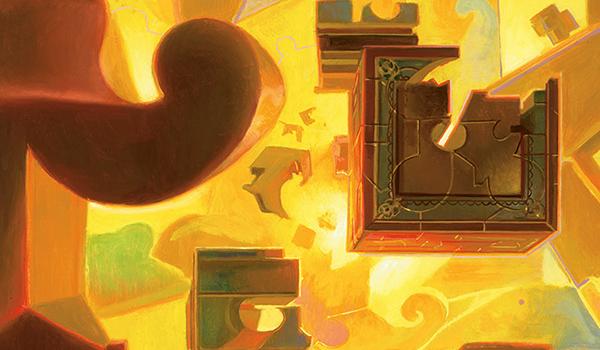
That isn't always the case. Sometimes, metagame positioning is more important, as with Condemn over Path to Exile last summer to answer Death's Shadow. And sometimes, the reason a card is powerful is also a barrier to its adoption.
Being difficult to understand or master makes many decks and cards less attractive for non-enthusiasts. The lower playability of complex cards makes them appear to be less powerful than weaker, more understandable cards. Ultimately, this perception becomes reality when the better card never sees play because there's no reason to pick it over the worse option.
We see this scenario play out both among individual cards and deck archetypes. Today's article seeks to address some such complexity/power dynamics in Modern.
Jace vs. Teferi
There's a problem that I've been struggling with for some time. Jace, the Mind Sculptor doesn't see much play in Modern. I assumed from experience that it would see play in a 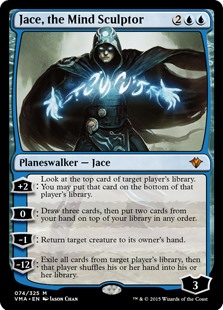 few archetypes as a finisher. However after the unbanning it saw almost no play. There was an initial burst of interest and then nothing for months.
few archetypes as a finisher. However after the unbanning it saw almost no play. There was an initial burst of interest and then nothing for months.
By contrast, Teferi, Hero of Dominaria was readily adopted right after release. There have also been articles outright stating that Teferi is better than Jace. The reason people always give for this belief is that Teferi functionally costs three mana, thanks to his +1 untapping lands. This makes him easier to defend the turn he's cast. But other than that distinction, on paper, Jace is the better planeswalker.
Direct Comparison
Consider the two planeswalkers side-by-side:
- Jace costs four to cast; Teferi, five.
- Jace can fit in any blue deck; Teferi must be in UWx.
- Jace has four abilities; Teferi, three.
- Jace starts with 3 Loyalty and +2s to 5; Teferi starts at 5 and +1s to 6.
- Jace casts Brainstorms, a Legacy-defining ability, every turn. Teferi draws a random card and untaps two lands.
- Jace can bounce a creature; Teferi can tuck any permanent.
- Jace's ultimate actually wins the game via decking after locking the opponent's draw steps. Teferi's ultimate creates an emblem that may functionally win the game after drawing lots of cards.
- Resolving then using Jace leaves four tapped lands. Resolving and +1ing Teferi leaves three.
Of my list, Jace is clearly better in categories 1, 2, 3, and 5. Teferi wins 4, 6, and 8, while 7 is a bit of a judgement call. Given how much stronger a Brainstorm every turn is than another random draw, I'd say that Jace is more powerful than Teferi. Given the additional constraints it's hard to see why Teferi's +1 makes up for being behind elsewhere. My struggle is that untapping lands doesn't seem like enough to push Teferi over Jace. My theory is that Teferi appears better than Jace because of how they're used.
The Complexity Problem
Jace is more complicated than Teferi, and this causes players to favor Teferi despite being arguably the weaker planeswalker. That Jace has four abilities to Teferi's three does play a role but it's not the only reason. The real distinction is that Teferi's abilities are very straightforward and therefore easier to wield. Jace's abilities, especially what I'd consider his primary mode of Brainstorming, are more powerful than Teferi's, but require far more thought and planning to use. Therefore, they are harder to use. The result is they're less useful and subsequently less powerful in context.
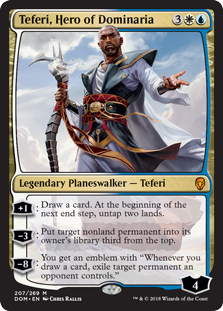 When Teferi resolves, the next step is obvious. If there is a permanent that cannot be ignored, -3 Teferi and tuck it back in its owners library. Otherwise, just start the +1 chain, gaining card and mana advantage. Eventually, creating Teferi's emblem may become an option.
When Teferi resolves, the next step is obvious. If there is a permanent that cannot be ignored, -3 Teferi and tuck it back in its owners library. Otherwise, just start the +1 chain, gaining card and mana advantage. Eventually, creating Teferi's emblem may become an option.
Jace complicates the decision process. On an empty board, choosing the +2 Fateseal ensures that Jace doesn't immediately die to Lightning Bolt. It also starts a clocking ticking down to Jace's game-winning ultimate. However, if the opponent has Assassin's Trophy or Dreadbore handy, then Jace provided minimal value. Fateseal also doesn't really dig for action when used on the controlling player. Choosing to 0 and Brainstorm gains card advantage while improving the hand, but leaves Jace vulnerable to a stiff breeze. Consistently choosing the right mode at the right time requires rigorous training.
Programing Dilemma
One way to think about the problem is to compare it to computer programming. As anyone who has ever participated in the PB&J exercise knows, a computer does exactly what it is told, no more and no less. As the complexity of a task increases linearly, the complexity of the programing needed to execute the task increases exponentially. In that vein, the simplified decision tree for using Teferi might work like this:
- IF Problematic Permanent [Evaluation Heuristic] AND >3 Loyalty AND High Threat [Evaluation Heuristic]
- THEN Execute -3 on that permanent
- IF NOT Execute+1. Triggered Event On End Step, Untap 2 Own Best Lands [Evaluation Heuristic]
The bracketed items are separate decision trees that would need to be written in detail. Also, before the real programmers start commenting, this is illustrative, not a definitive program. It's also relatively straightforward, and only includes three complicated pieces in designing the evaluation heuristics for the computer to follow. Jace is another matter.
- IF Problematic Creature [Evaluation Heuristic] AND High Threat [Evaluation Heuristic]
- THEN Execute -1 on that Creature
- IF NOT Next Tree
- IF Bolt threat >50% [Odds Calculation] OR Winning Decision [Decision Tree]
- Then Execute +2
- IF Winning Decision [Decision Tree] OR Strong Own Hand [Evaluation Heuristic]
- Then target opponent [Evaluation Heuristic]
- IF Weak Own Hand [Evaluation Heuristic]
- Then target self [Evaluation Heuristic]
- IF Winning Decision [Decision Tree] OR Strong Own Hand [Evaluation Heuristic]
- IF NOT Execute +0 [Brainstorm Evaluation Heuristic]
- Then Execute +2
There are a lot of additional programs to write to make Jace work, and I haven't even gotten to conditionals. I can't blame anyone not wanting to deal with the headache of unlocking Jace's power and just running Teferi.
Wielding Complexity
This is not to say that complexity is a bad thing. Since time immemorial, control players have benefited from playing complex decks because it was balanced by the additional power they gained. Despite evidence to the contrary, aggressive decks have a reputation for being easy mode because their path to victory is straightforward. Control decks have to maneuver through opposing threats and gradually wear the opponent out, often winning via narrow margins. As a result, the player most likely to win is the one that can outmaneuver their opponent and/or identify what is actually important and focus on only that thing.
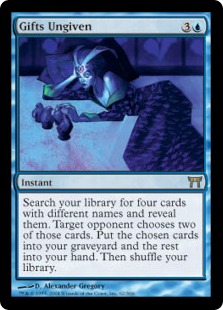 Complexity in card and deck design often leads to greater power. Consider the classic draw spell, Fact or Fiction. Back in Invasion block and for years afterward in Extended and Type 1 (now Vintage), it was the card draw spell.Fact's decisions for the caster were fairly straightforward. You played Fact whenever the opportunity arose, chose the best pile, and then won the game. As a result, it was everywhere for years.
Complexity in card and deck design often leads to greater power. Consider the classic draw spell, Fact or Fiction. Back in Invasion block and for years afterward in Extended and Type 1 (now Vintage), it was the card draw spell.Fact's decisions for the caster were fairly straightforward. You played Fact whenever the opportunity arose, chose the best pile, and then won the game. As a result, it was everywhere for years.
Meanwhile, Fact's direct descendant Gifts Ungiven has only ever seen niche play. The caster chooses the cards and the opponent picks the piles, meaning the piles usually can't just be for value, but must be specifically designed. Thus, when it's used as a combo tutor, Gifts is more powerful than Fact ever was. However, it's lackluster as a generic power card.
A common thread during the Caw-Blade era of Standard was that the better player always won. Irrespective of starting position, the more experienced, practiced, and skillful player would win the Caw-Blade mirror because making lots of decisions favored them. My memory of that Standard is that thanks to all the cantrips and deterministic play patterns, luck was a non-factor in most games. Managing complex board states and decision trees is already part of the game, and that Standard showed clearly just how powerful mastering that skill actually is. Wielding complexity correctly wins games.
A Double-Edged Sword
The key word there is correctly. If a player isn't ready for the difficulty of their deck, it will hurt them. The more decisions a player has to make the more opportunities they have to make 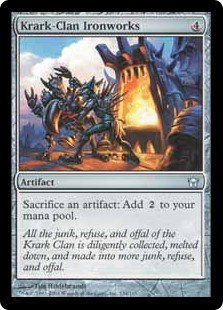 the wrong decision. How many times in my tournament reports have I misunderstood an interaction or deck and lost as a result? One time, I played a deck that was too complicated given my health, and punted the tournament away.
the wrong decision. How many times in my tournament reports have I misunderstood an interaction or deck and lost as a result? One time, I played a deck that was too complicated given my health, and punted the tournament away.
There have been a lot of articles about how to become better at Magic, and the most consistent advice is to practice. The game is incredibly complicated by its nature. Deliberately adding more complexity to games may give more opportunities to win, but it requires more right decisions. Over a long tournament, the additional strain can be overwhelming until exhaustion becomes a factor.
Playability of Complexity
As a result, complex cards and decks see less play than more straightforward ones because the latter group is easier for inexperienced players to use. I've previously warned players about the danger of playing decks that are too difficult for their level. Reason being, unlocking the power of complex decks takes considerable practice and experience. Jumping in at the deep end is a surefire way to lose games.
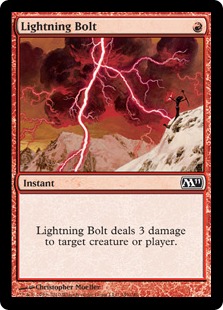 The same thing can happen with cards. The most-played powerful cards tend to be relatively easy to understand and then wield. Lightning Bolt, Thoughtseize, Tarmogoyf, and Path to Exile have powerful effects that are very easy to comprehend and effectively use. Bedlam Reveler, Death's Shadow, Primeval Titan, and Terminus are also very powerful cards (arguably more in the right decks), but only when used correctly in the right context. Show them to a new player and there's a good chance they won't understand why they should play the cards at all. The first group doesn't have that problem.
The same thing can happen with cards. The most-played powerful cards tend to be relatively easy to understand and then wield. Lightning Bolt, Thoughtseize, Tarmogoyf, and Path to Exile have powerful effects that are very easy to comprehend and effectively use. Bedlam Reveler, Death's Shadow, Primeval Titan, and Terminus are also very powerful cards (arguably more in the right decks), but only when used correctly in the right context. Show them to a new player and there's a good chance they won't understand why they should play the cards at all. The first group doesn't have that problem.
Power and complexity are often intertwined, but the magnitude of the latter impacts playability by limiting widespread adoption. Many decks and cards see niche at best play because they're just too much work for the average player. Why did Amulet Bloom never catch on, or why wasn't Ironworks everywhere after Matt Nass's winning streak? The answer comes down to the fact that they are so complicated that it turns players off. Simpler cards are more playable because they're easier for players to latch onto and comprehend the value. And a card's theoretical power is irrelevant if it never sees play.
The Familiarity Complication
Of course, this ease of use isn't the whole story. Another factor that I don't see discussed is that most players are more familiar with Teferi and are therefore drawn to him rather than Jace. Jace, the Mind Sculptor has been legal in Modern slightly longer than Teferi, but Teferi is also Standard-legal. From personal experience, there are a lot of control mages running UW in both formats. Thus, they have more opportunities to play Teferi and will naturally gravitate towards him, regardless of his power relative to Jace's. To have the same play history with Jace takes being a dinosaur like me or a Legacy control player. Teferi's lower complexity made him attractive to begin with, but being Standard-legal in a good deck pushed him over the top.
Food For Thought
For another way to think about this problem, consider this thought experiment about industrialization.
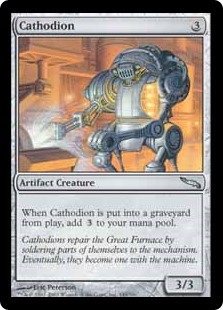 A customer needs a wooden table and chairs constructed from a pile of lumber. They have the option of using an automated assembly line or handing the wood off to a craftsman. The assembly line produces the exact same dining set every time. It is not particularly interesting to look at, but it is perfectly serviceable and built to last. The craftsman will produce a set equivalent to their skill, which the customer cannot measure. A master craftsman will produce a set of greater quality and beauty than a machine ever could; an average one will equal the mass produced set; a bad one will make a set worth less than the starting lumber. The lesson then argued that because most humans are risk averse, they would choose the mass produced product, all else being equal.
A customer needs a wooden table and chairs constructed from a pile of lumber. They have the option of using an automated assembly line or handing the wood off to a craftsman. The assembly line produces the exact same dining set every time. It is not particularly interesting to look at, but it is perfectly serviceable and built to last. The craftsman will produce a set equivalent to their skill, which the customer cannot measure. A master craftsman will produce a set of greater quality and beauty than a machine ever could; an average one will equal the mass produced set; a bad one will make a set worth less than the starting lumber. The lesson then argued that because most humans are risk averse, they would choose the mass produced product, all else being equal.
Applying the analogy back to Magic, using Jace is like handing the craftsman the wood. The outcome depends on the skill of the wielder more than any other factor. Teferi is a machine. He produces reliable and predictable results, meaning he's easier to play. This reliability and ease of play makes Teferi the more attractive option for many players, even if he's not as powerful as Jace.





Amazing article! Using simple algorithmic to prove your point is a very interesting idea.
You’ve also made a point when telling about the complexity of Death’s Shadow. It did stay in the… shadows for 7 years with all the required tools at its disposal before reaching the competitive tables. Before that, some people (me included) only saw it as a funny sideboard option for burn/aggro match-ups with grixis control/delver.
The only thing I would like to add about Teferi is his ability to effectively ramp. Using his +1, you can attack as soon as turn 6 with a colonnade, leaving 3 menacingly untapped lands at the end step.
That complexity issue may also be a factor as to why hardened affinity is played more than good old affinity, and why powerful combo deck like KCI and Storm always stays in short numbers at tournaments. Fatigue is a huge factor when you need to play 9+ rounds, which leads us to another question: does the added payoff of a card matter in front of its complexity when your goal is to top 8 a big tournament?
While this is an interesting conjecture, it seems a bit off to me. I mean, UW control is the kind of deck that attracts players who are willing and able to deal with increased complexity. So while I do agree that Jace is better than Teferi, I don’t think an increased level is the reason why (or at least the primary reason why.) I don’t have another suggestion of why that might be though.
For true enthusiasts, sure. Newcomers are another matter. However, I’d bet that even those control enthusiasts who are willing and able to manage all the complexity in the world appreciate when things are made easier for them.
I believe the Teferi vs Jace situation isn’t down the Power Level Discrepancy. Jace is more powerful than Teferi. Once you untap with Jace, the UW Control player is incredibly likely to win. The problem here is rather that the UW Control player is also very likely to win when Teferi untaps (though less so). Due to Teferi’s untap ability combined with higher loyalty, Teferi is far more likely to untap. In this case, it that the deck doesn’t need Jace’s extra Card Advantage, the Tempo from Teferi is more important
This is true, but it’s not that simple. If a control player is playing either planeswalker it’s because they expect it to survive. The only time I’ve found Teferi’s survivability significantly greater is when you’re just slamming him down turn 5 because there’s nothing else to do.
Again, I’m arguing that the stated reasons aren’t the real story of Teferi vs Jace and in terms of getting players to pick up the deck Teferi is the far better option.
I think that the reason teferi is played more comes down to not is complexity but its low risk, Jace is much more powerful but is also a riskier play. I think this is similar to why people have never run disrupting shoal in control decks despite it’s immense power: there is simply too much risk involved in getting the power play to line up in a game.
Disrupting Shoal is card disadvantage. That’s the reason it’s not played in control. Where it shines is in tempo, not control.